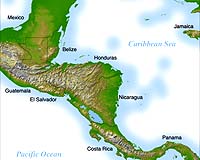 |
Paris (AFP) Nov 23, 2009 Tackling climate change should also include providing low-carbon energy to the poor, UN agencies said Monday, pointing out that almost one third of the world's population remains in the dark at night. The report, The Energy Access Situation in Developing Countries, is published by the UN Development Programme (UNDP) and World Health Organization (WHO). It notes that 80 percent of people without access to electricity live in the world's least developed countries, led by sub-Saharan Africa. The figure is highest in Burundi, Chad and Liberia, where 97 percent have no electricity. Minoru Takada, in charge of energy and the environment at the UNDP, said failure to gain access to reliable energy made it "particularly difficult" for such countries to attain the UN's Millennium Development Goals on reducing poverty rates by 2015. Lack of access to cleaner, reliable sources of energy means that three billion people depend on traditional biomass and coal to cook their food or heat their homes, says the report. The fuels are not only a significant contribution to global warming because of the partial combustion of the gases. Particles and fumes from them are also blamed for the death of two million people each year from pneumonia, chronic lung disease and lung cancer. Takada told AFP it would cost about one dollar (65 euro cents) per person to provide electricity. For remote rural households, small-scale hydro power or solar panels would be the best bet. Funding for low-carbon technology in developing countries will be a key issue at a UN summit in Copenhagen next month on building a new pact to tackle global warming beyond 2012, notes the report. "Interventions that improve combustion efficiency and hence reduce emissions and exposure to pollutants can benefit health and mitigate climate change," it added.
earlier related report More than four million jobs have been lost in the European Union since a financial crisis first triggered recession in the United States, and the tally would have been more but for measures such as shorter working hours. However, the biggest changes in working patterns across the 27-member EU may be yet to come -- with the transition to a low-carbon economy over the next decade expected to force a radical realignment of tasks for many workers. Each year, the report says, some 22 percent of European workers change jobs -- with high rates of "dynamism" at more than one in four employees in Britain, Denmark, Finland and Spain. However, periods of unemployment remain entrenched -- with nearly half of all spells out of the workforce lasting longer than a year, compared to just one in 10 across the US. "Although the total net job creation effects may not be very large -- as creation of new 'green' jobs and greening of existing jobs will partly be offset by loss of some existing jobs -- the underlying structural changes will involve re-allocation of workers across economic sectors and skill types," the report said of the impact of new policies to combat global warming. With new technologies and skills requirements taking root, training and publicity campaigns are said to hold the key. Simulations suggest that "total employment in the renewable sector could amount to some 2.3 million jobs in 2020," although net new jobs may only be as little as 115,000, about a third of which are expected to be skilled jobs. Unemployment across the EU -- home to half a billion people and the world's biggest trading bloc -- was over 22 million people in September, the highest level since comparable records began in 2000. The commission expects the rate across the 16 countries that use the euro currency to rise to 10.7 percent in 2010 -- well over 15 million people -- and hit 10.9 percent in 2011. Share This Article With Planet Earth
Related Links
 Central America demands billions in climate damages
Central America demands billions in climate damagesGuatemala City (AFP) Nov 20, 2009 Central American nations will demand 105 billion dollars from industrialized countries for damages caused by global warming, the region's representatives said on Friday. Central American environment ministers gathered in Guatemala to discuss the so-called "ecological debt" owed to them and to set out a common position ahead of climate talks in Copenhagen next month. Guatemalan ... read more |
|
| The content herein, unless otherwise known to be public domain, are Copyright 1995-2009 - SpaceDaily. AFP and UPI Wire Stories are copyright Agence France-Presse and United Press International. ESA Portal Reports are copyright European Space Agency. All NASA sourced material is public domain. Additional copyrights may apply in whole or part to other bona fide parties. Advertising does not imply endorsement,agreement or approval of any opinions, statements or information provided by SpaceDaily on any Web page published or hosted by SpaceDaily. Privacy Statement |